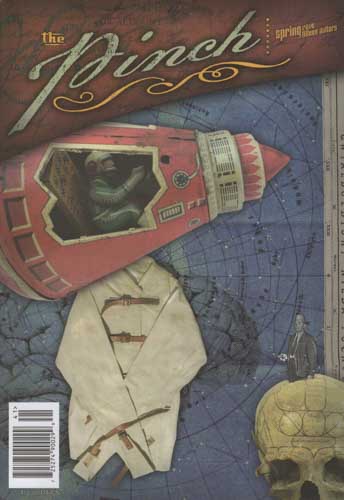The Pinch – Spring 2014
The Pinch is so expressive and excellent that I’m confident any instance that I pick up this issue I will open it and begin reading something great. Publishing fiction, nonfiction, poetry, visual art, and the winners of the 2013 Pinch Literary Awards, this issue is just brimming with work you need to read and art that deserves your attention. The Pinch is so expressive and excellent that I’m confident any instance that I pick up this issue I will open it and begin reading something great. Publishing fiction, nonfiction, poetry, visual art, and the winners of the 2013 Pinch Literary Awards, this issue is just brimming with work you need to read and art that deserves your attention.
Jill Talbot’s “Stalled” was among the first few pieces I read, and I wasn’t disappointed. It is broken into small chunks starting,
I like to live on corners, to position myself at the intersection of directions and indecisions. I understand repetition, ritual, the pause before going on, passing through. I even understand turning around and going back, again. Like the way I’ve already written about that house in Utah, but I’ve left something out and need to go back to it again, where I will find myself answering a phone call.
And go back she does. She uses every tactic that she points out in this beginning, and we are rewarded with the details and flushness of the story, which ends, of course, with a phone call.
What starts Mikko Harvey’s “Into the Ordinary” makes it seem as if it will be an ordinary narrative poem—“On his way to church the boy / sees the church reflected / in the lake beside it . . .”—but it is full of so much weight that I urge you to read on. Sick of the current church, the boy seeks out a new one, at the bottom of a lake. His father warns him, but “This is the church for me, / he thinks.” The end is the perfect example of show not tell, so I’ll let his words do the talking:
They are drowning.
Floating in their pews, they are
praying for air. The boy screams
“Get out of here! You can breathe
outside!” He tries to drag
their bodies but they won’t go.
There are hundreds of them,
fathers and sons, mothers and an
organ player. Bubbles are coming
from the pastor’s mouth. It is
sort of beautiful, the boy thinks
and, ignoring his own advice, dies
alongside them.
K. Vish’s “Birthday Boy” is one long sentence without any punctuation, winding and showing the rapidity in which life can go, a point in which form greatly aids in telling his story. About parenting, it starts with “you” as a child and ends on just the next page with your grandson approaching you. You ran away when you realized your parents weren’t perfect. But as you ride the train to avoid life, life keeps moving without you:
. . . Ananth they’re a bunch of wild monkeys I need your help I need you to come back so you say you will and consider getting down at the next stop but you don’t recognize the name of the station . . . so you stay on the train and hope it slows down but secretly you hope it goes faster because you can feel something catching up with it and you lie down in your berth and close your eyes because you feel so damn tired and your bones are in a constant State of Ache and there is a tapping on your shoulder and you open your eyes and it is your grandson . . . and he says dammit Thatha I couldn’t stand it anymore I had to run away and he pulls out his phone to show you pictures of the family he ran away from . . .
This story is quite the ride, for both “you” and the reader.
Melissa Ferone’s “Touch” weaves together short vignettes or asides that together create a beautiful piece of creative nonfiction. Each section eludes to a different idea of touch, and the sections that are most effective are the ones where she remembers from her childhood as it shows the innocent and naïve view:
When I was a child, I told my sister I knew how to pin a butterfly, though I had only seen it done by my first grade teacher. Thus began the explicit nature ofcause and effect, the monarch bathed in the purple reach of our mother’s lavender. I pinched both wings between forefinger and thumb: Watch, I said,Watch closely. Alive, I pinned it to the wall with thumbtacks and safety pins; the thin velvet wings shred to pieces, the abdomen drained and writhing.
When you’re older you understand nothing really belongs to you. Even our bodies are borrowed. The bodies of other living things are also borrowed, and fragile.
These pieces are webbed with only small instances where she talks about how she was raped. It keeps the story and the reader at an elegant distance from the rape but uses outside illustrations to show the effect and reflection of it. It’s definitely the best story I’ve read of its subject matter.
And of course there is plenty, plenty more to digest in this issue because as you may have noticed, I didn’t even touch yet on the poetry or the award winners. But I guarantee that if you get the issue, you’re in for a treat to finish them for yourself.
[www.thepinchjournal.com]





